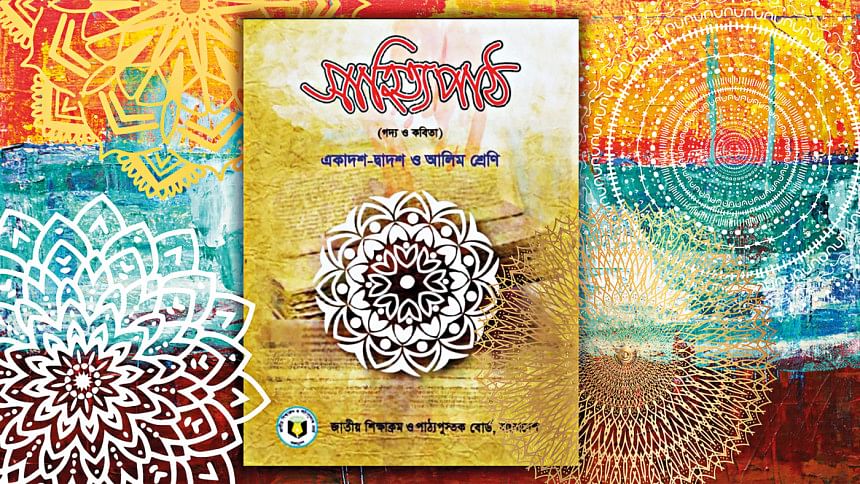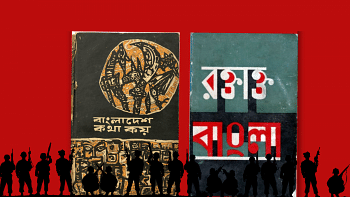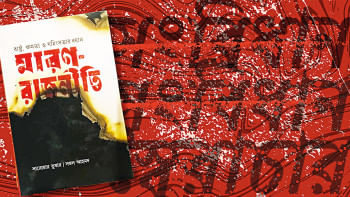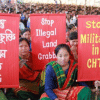It’s all crimson inside ‘Shahittopath’

"Mr Nurul Amin couldn't realise what bureaucracy had dragged him down to". Remember how you needed to absolutely memorise this line with context and underlying meaning for answering comprehension-based questions? Well, that was to earn a couple of marks in exams. Turns out, it is also a 101 guide on how to earn a nation back.
Say, it is like a chess match. The chessboard is a rocky field that is to be conquered for justice. The 11-12th grade National Curriculum and Textbook Board (NCTB) textbook on Bangla literature, Shahittopath is, in fact, an undying testament to the rebellious hearts that are prescribed to read it. The spirit of rising against injustice and turning up your voice just a tad bit to speak the truth is strong in this book. And you know what? A book that is read by over one and a quarter million blooming hearts every year, every individual's "tad bit" is enough to let the words run over trillions of miles of land.
There are several Nuruls in Shahittopath. One is Chief Minister Nurul Amin in "Bayannor Dinguli", narrated by Bangabandhu Sheikh Mujibur Rahman. Standing with his dignified corporals, Nurul Amin stands at one side of the chessboard. Nurul Amin fired against the protesting students who wanted a reformation of the state language. Bangabandhu talks about the cowardice that the then-governors showed by shooting the students who ignited the streets with passion.
The match grows dirty and the battleground today is covered in wounds and regret. The book also houses the beloved short story, "Raincoat", in which Akhtaruzzaman Elias eloquently paints a damp yet nerve-wracking day of 1971 Dhaka through the eyes of another Nurul—Nurul Huda, a seemingly neutral person in this chess match.
On the other side stands another Nurul—Nuruldin. In Syed Shamsul Haque's "Nuruldiner Kotha Mone Pore Jay", Nuruldin chants the lore of Bengal's much-awaited freedom with the rhythm of united marching steps against fascism. Let the match begin.
A passion of youth. The time when they want the jury to announce nothing but the verdict of life—the verdict of valid existence. In Shahittopath, Shukanto Bhattacharjee depicts the passion soulfully in his poem, "Atharo Bochhor Boyosh". He says,
"This age knows the virtue of sacrificing blood
As they sprint in the speed of pressurised vapour,
The pouch containing departed lives stay unemptied
Sucking the souls with a vigorous promise."
A compilation of revolutionary literary creations is never complete without the words of the rebel poet Kazi Nazrul Islam. In "Amar Poth", he reminds us about the urgency of embracing one's individuality and unique righteousness, even in the face of certain oppression. "My truth will show my way…One who is certain about their own identity has the spirit of never bowing their head to anyone but the truth"—such words swing in the air like an irreproachable sword. He echoes the words of the brave warrior within him throughout "Bidrohi" by bringing up the age-old mythical and historical legends who raise their heads against injustice. From Bheem to Orpheus, he is reincarnated as the emperor of destruction and the composer of ballads as sweet as honeysuckles. Lastly, he invites many others to be revolutionaries as long as injustice remains.
The match grows dirty and the battleground today is covered in wounds and regret. The book also houses the beloved short story, "Raincoat", in which Akhtaruzzaman Elias eloquently paints a damp yet nerve-wracking day of 1971 Dhaka through the eyes of another Nurul—Nurul Huda, a seemingly neutral person in this chess match. Through witty humour and subtle satire, Elias pulls out the cruel culprits of several massacres caused during that time. From Ishak Mia to the college principal Dr Afaz Ahmed, every war criminal has been unveiled by this powerful wordsmith. Nurul's dramatic commute to work through a military-occupied Dhaka is bone-chilling. "An umbrella won't be enough in this rain, honey. You better take Mintu's raincoat with you." "Raincoat" demonstrates the pain and concerns of a teacher and the sheer helplessness he experiences in the face of atrocities.
Shahittopath proudly upholds the legacy of the people who built the foundation of triumph against persecution by grinding down the very shackles binding their hands. In Abu Jafar Obaidullah's "Ami Kingbodontir Kotha Bolchhi", the poet shows the benevolence and strength of the common people, including farmers, fishermen, helpless widows, and tortured slaves—they symbolise the people's freedom.
"I'm speaking of legends
I'm speaking of my ancestors
His palms were fragrant earth
Whose backs had wounds as bright as a rokto joba"
Lastly, "February 1969" by Shamsur Rahman also carries the spirit of "Ami Kingbodontir Kotha Bolchhi". The chess match is escalating at this point. Both sides are struggling to checkmate the other. The rooks of Nuruldin recall the bloodshed of the revolutionaries of 1952 and 1969 as they march straight towards their final nemeses. The scattered bloodstains of '52's Salam and Barkat mingle with that of '69's Shamsuzzoha and Shaheed Asad.
The crusade of Shahittopath has come to an end, but the chess match is still ongoing. Nuruldin and his comrades fetch more stories to warm their shattered hearts and move forward to write some themselves. Nurul Huda needs to take a stand before his legs are tied.
There will be a checkmate. The echoes of emancipation have been howled beyond the chess field. Nurul Huda's raincoat has been taken off by the brute pawns, but by now he has learned to rise in spirit. There's only one row of squares left to be conquered by Nuruldin's army—the only row where Nurul Amin is standing.
Checkmate. The game has come to an end. The fascist has fallen.
Now, Nuruldin's people look back at the bloodied chessboard, wretched and adrift. They hum the words of "Manob Kollan" by Abul Fazal and absorb the juvenile spirit in "Aparichita" by Rabindranath Tagore as they mend the field. They bring about a new dawn.
Zarafet sits by the end of the horizon and hums the tunes of songs sung by the unsung.

 For all latest news, follow The Daily Star's Google News channel.
For all latest news, follow The Daily Star's Google News channel. 









Comments